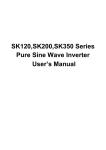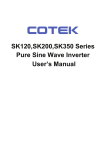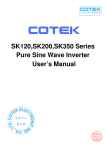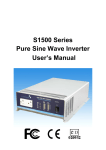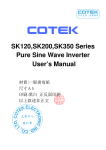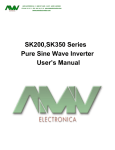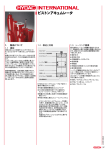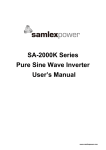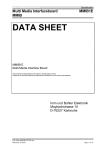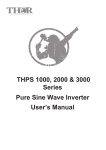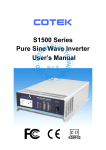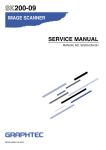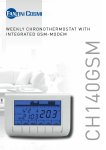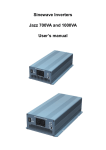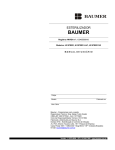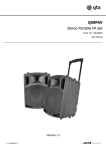Download SK120,SK200,SK350 Series Pure Sine Wave Inverter User`s Manual
Transcript
SK120,SK200,SK350 Series Pure Sine Wave Inverter User’s Manual Table of contents 1. Important Safety Information.……………………………………………… 2 1-1 General Safety Precautions…………………………………………… 2 1-2 Precautions When Working with Batteries……….………………….. 2 2. Features………………………………………………………………………... 3 2-1 Electrical Performance………………………………………………… 4 2-2 Mechanical Drawing of Socket Type(Power Claw PP75)… …..…. 7 2-3 Mechanical Drawing of Strip Wire Type……………….……………. 8 3. Instructions………………………………………………….………………… 9 3-1 Front Panel Operation..………………………………………………... 9 3-2 Rear Panel Operation..………………………………………………… 11 3-3 Protections Features……..……………………………………………. 13 3-4 Installation.………………………………………………….…………... 13 3-5 Making DC Wiring Connections……...……………………………….. 14 3-6 AC Safety Grounding…………………………………………………... 15 3-7 Inverter Operation……………………………………………………… 16 4. Troubleshooting guide……………………………………………………… 17 5. Maintenance…………………………………………………………………… 18 6. Warranty……………………………………………………………………….. 18 Copyright :This manual is the copyright of COTEK Electronic lnd. Co., Ltd. without permission of the owner. Be not allowed to reproduc or copy 1 1. Important Safety Information WARNING! Before installing and using the Inverter, you need to read the following safety information carefully. 1-1. General Safety Precautions 1-1-1. Do not expose the Inverter to rain, snow, spray, bilge or dust. To reduce risk of hazard, do not cover or obstruct the ventilation openings. Do not install the Inverter in a zero-clearance compartment. Over heating may result. 1-1-2. To avoid a risk of fire and electronic shock. Make sure that existing wiring is in good electrical condition; and that wire size is not undersized. Do not operate the Inverter with damaged or substandard Wiring. 1-1-3. This equipment contains components which can produce arcs or sparks. To prevent fire or explosion do not install in compartments containing batteries or Flammable materials or in locations which require ignition protected equipment. This includes any space containing gasoline-powered machinery, fuel tanks, or joints, fittings, or other connection between components of the fuel system. 1-2. Precautions When Working with Batteries 1-2-1. If battery acid contacts skin or clothing, wash immediately with soap and water. If acid enters eye, immediately flood eye with running cold water for at least 20 minutes and get medical attention immediately. 1-2-2. Never smoke or allow a spark or flame in vicinity of battery or engine. 1-2-3. Do not drop a metal tool on the battery. The resulting spark or short-circuit on the battery of other electrical part may cause an explosion. 1-2-4. Remove personal metal items such as rings, bracelets, necklaces, and watches when working with a lead-acid battery, A lead-acid battery produces a short-circuit current high enough to weld a ring or the like to metal, causing a severe burn 2 2. Features Pure sine wave output (THD < 3%) Output frequency:50 / 60Hz switch selections Input & output completely isolated design High efficiency 84~94% Capable of driving inductive & capacitive loads at the start moment. A LED Indicator with twin color displays all operation status. Loading and temperature controlled cooling fan. Built in advanced microprocessor to make friendly interface with user. Protection:Input low voltage Overload Short circuit Low battery alarm Input over voltage Over temperature 3 2-1. Electrical Performance Specification Model No. Item SK120-112 SK120-124 SK120-148 SK120-212 SK120-224 SK120-248 Continuous Output Power 120W Maximum Output Power 132W Surge Rating (Max) 240W Input voltage Output Voltage 12Vdc 24Vdc 100 / 110 / 120Vac Frequency Output Waveform Input Voltage Regulation 12Vdc ± 5% 24Vdc 48Vdc 220 / 230 / 240Vac ± 3% 50 / 60Hz +/- 0.05% (Switch Selections) Efficiency (full load) Max *1 48Vdc Pure Sine Wave ( THD < 3% ) 89% 91% 93% 92% 93% 94% 10.5-15 21.0-30 42-60 10.5-15 21.0-30 42-60 VDC VDC VDC VDC VDC VDC Failure Indicator Red LED Overload (Shut down), Short Circuit (Shut down), Protection Reverse Polarity (Fuse), Over / Under Input Voltage (Auto recovery), Over Temperature (Auto recovery). Remote Control Safety Yes (ON / OFF mode controlled by hard wire) See 3-2 Meet UL458 EN60950-1 EN55022:1997 EMC FCC Class A EN61000-3-2:1998 e-mark EN61000-3-3:1995 e13 023495 EN55024:2001 Operating Temperature Range 0 - 40 ℃ Storage Temperature Range -30℃ to 70℃ Cooling convection cooling Dimensions 185(L)x147(W)x60(H)mm / 7.3(L)x5.8(W)x2.36(H) Inch Weight 1kg Note: The specifications are subject to change without notice. *1 : This test condition is normal DC input (13.5V) and temperature 25℃. 4 Specification Model No. Item SK200-112 SK200-124 SK200-148 SK200-212 SK200-224 SK200-248 Continuous Output Power 200W Maximum Output Power 220W Surge Rating (Max) 400W Input voltage 12VDC Output Voltage 24VDC 100 / 110 / 120Vac Frequency 12VDC 24VDC 48VDC ± 5% 220 / 230 / 240Vac ± 3% 50 / 60Hz ± 0.05% selectable by DIP switch (Switch Selections) Output Waveform Efficiency (full load) Max 48VDC Pure Sine Wave ( THD < 3% ) *1 Input Voltage Regulation 89% 91% 92% 91% 93% 94% 10.5-15 21.0-30 42-60 10.5-15 21.0-30 42-60 VDC VDC VDC VDC VDC VDC Failure Indicator Red LED Overload (Alarm then shut down) Short Circuit (Shut down) Protection Reverse Polarity (By fuse) Over / Under Input Voltage (Alarm and shut down then auto recover) Over Temperature (Alarm and shut down then auto recover) Remote Control Yes (ON / OFF mode controlled by hard wire) Refer to 3-2 Safety Standards ---- EMI Conduction & Radiation Certified FCC class B EMS Immunity ---- Certified EN60950-1 Certified EN55022; EN 61000-3-2, -3-3 Certified EN55024; IEC 61000-4-2, 3, 4, 5, 6, 8, 11 Operating Temperature Range 0~40 ℃ Storage Temp. & Humidity -30℃~70℃, 10~95% RH Cooling FAN (Controlled by load and temperature) Dimensions (WxHxL) 147.0x61.3x177.5 mm / 5.787x2.413x6.988 inch Weight 1.74kg Note: The specifications are subject to change without notice. *1 : This test condition is normal DC input (13.5V) and temperature 25℃. 5 Specification Model No. Item SK350-112 SK350-124 SK350-148 SK350-212 SK350-224 SK350-248 Continuous Output Power 350W Maximum Output Power 385W Surge Rating (Max) 700W Input voltage 12VDC 24VDC 12VDC 100 / 110 / 120VAC ± 5% Output Voltage Frequency 24VDC 48VDC 220 / 230 / 240VAC ± 3% 50 / 60Hz ± 0.05% selectable by DIP switch (Switch Selections) Output Waveform Efficiency (full load) Max 48VDC Pure Sine Wave ( THD < 3% ) *1 Input Voltage Regulation 89% 91% 92% 91% 93% 94% 10.5-15 21.0-30 42-60 10.5-15 21.0-30 42-60 VDC VDC VDC VDC VDC VDC Failure Indicator Red LED Overload (Alarm then shut down) Short Circuit (Shut down) Protection Reverse Polarity (By fuse) Over / Under Input Voltage (Alarm and shut down then auto recover) Over Temperature (Alarm and shut down then auto recover) Remote Control Safety Standards Yes (ON / OFF mode controlled by hard wire) Refer to 3-2 Certified UL 458 Certified EN 60950-1 (UL only for “GFCI” receptacles) EMI Conduction & Radiation Certified FCC class A EMS Immunity ---- Certified EN 55022; EN 61000-3-2, -3-3 Certified 55024; IEC 61000-4-2, 3, 4, 5, 6, 8, 11 Operating Temperature Range 0~40 ℃ Storage Temp. & Humidity -30℃~70℃, 10~95% RH Cooling FAN (Controlled by load and temperature) Dimensions (WxHxL) 147.0x61.3x177.5 mm / 5.787x2.413x6.988 inch Weight 1.84kg Note: The specifications are subject to change without notice. *1 : This test condition is normal DC input (13.5V) and temperature 25℃. 6 2-2. Mechanical Drawing of Socket (Power Claw PP75) Unit: mm [inch] 7 2-3. Mechanical Drawing of Strip Wire Type Unit: mm [inch] 8 3. Instructions This power inverter series is a the member of the most advanced line of mobile AC power systems available. To get the most out of the power inverter, it must be installed and used properly. Please read the instructions in this manual before installation and operation this model. 3-1. Front Panel Operation: 3-1-1. Front view: PURE SINE WAVE INVERTER POWER STATUS FREQ. AC OUTPUT 50Hz 60Hz POWER STATUS PURE SINE WAVE INVERTER FREQ. 50Hz 60Hz AC OUTPUT 3-1-2. AC Frequency:Selected by Dip Switch Frequency Dip Switch 50 HZ ON 60 HZ OFF 9 3-1-3. Status:Display Power & Fault Status Green LED LED Signal Status Solid Power OK Red LED LED Signal Status Blink (Fast) OVP Blink (Slow) UVP Blink (Intermittently) OTP Solid 3-1-4. AC Output (available OLP Sockets): N o r t h A m e r i c a ( G F C I )N E M A 5 - 1 5 R United Kingdom Universal Continental E u r o pAeu s t r a l i a IEC 3-1-5. DC Input (available type): CIGARET 10 PP75 STRIPPED WIRE / New Zealand 3-2. Rear Panel Operation: ON POWER DC INPUT NEG (-) OFF REMO. POS(+) REMOTE PORT CHASSIS GROUND ENB ENB GND DC INPUT ON POWER OFF REMO. REMOTE PORT CHASSIS GROUND ENB ENB GND 3-2-1. ON / OFF / REMOTE Main Switch. 3-2-1-1. Before installing the inverter, make sure the main switch must be “OFF”. 3-2-1-2. Before using the remote unit, make sure the main switch must be “ REMOTE”. 3-2-1-3. Ensure the remote control contact is off. 3-2-1-4. Remote Port:Place 0.75mm2 and Screw type cable between the remote port and the panel. 3-2-1-5. Remote port ON/OFF inverter setup status MODE Ⅰ MODE Ⅱ VCEO > VBAT 11 MODE Ⅲ MODE Ⅳ NOTE: Only one of control mode can be presented. When operating. 3-2-2. DC Input Terminals: Connect to 12V / 24V / 48V battery or the other power sources. 【+】is positive,【-】is negative. Reverse polarity connection will blow internal fuse and may damage inverter permanently. Model DC Input Voltage Minimum Maximum 12 V 10.5 15.0 24 V 21.0 30.0 48 V 42.0 60.0 3-2-3. Chassis Ground: using # 8 AWG wire to connect vehicle chassis. WARNING! Operation of the inverter without a proper ground connection may result in an electrical safety hazard. 12 3-3. Protections Features: DC Model Over Voltage ShutRestart down Input (VDC) Over Temperature Protection Under Under Voltage Voltage ShutAlarm Restart down 12 V 16V 13V 11.0V <10.5V 12.5 24 V 32V 26V 22.0V <21.0V 25.0 48V 62V 52V 44.0V <42.0V 50.0 Note: INTERIOR Shut-down Restart 55℃ 45℃ The specifications are subject to change without notice. 3-4. Installation: Where to install. The power inverter should be installed in a location that Meets the following requirements: 3-4-1. Dry – Do not allow water to drip or splash on the inverter. 3-4-2. Cool – Ambient air temperature should be between 0℃ and 40℃, the cooler the better. 3-4-3. Safe – Do not install in a battery compartment or other areas where flammable fumes may exist, such as fuel storage areas or engine compartments. 3-4-4. Ventilated – Allow at least one inch of clearance around the inverter for air flow. Ensure the ventilation openings on the rear and front of the unit are not obstructed. 3-4-5. Dust – Do not install the Inverter in a dusty environments where are dust, wood particles or other filings/shavings are present. These dust can be pulled into the unit when the cooling fan is operating. 13 3-4-6. Close to batteries – Avoid excessive cable lengths but do not install the Inverter in the same compartment as batteries. Use the recommended wire lengths and sizes (see section 3-5). Also do not mount the Inverter where it will be exposed to the gases produced by the battery. These gases are very corrosive and prolonged exposure also will damage the Inverter. WARNING! Shock Hazard. Before proceeding further, carefully check that the Inverter is NOT connected to any batteries, and that all wiring is disconnected from any electrical sources. Do not connect the output terminals of the Inverter to an incoming AC source. 3-5. Making DC Wiring Connections: Follow this procedure to connect the battery cables to the DC input terminals of the Inverter. Your cables should be as short as possible (Ideally, less than 6 feet / 1.8 meters ) enough to handle the required current in accordance with the electrical codes or regulations application. Cables are not an adequate gauge (too narrow) or too long will decrease the inverter performances such as poor surge capability and low input voltage warnings frequently and shutdowns. UVP warning presents due to DC voltage drop across the cables from the inverter to the batteries. The longer or narrower the cables, the greater the voltage drop. Increasing your DC cable size will help improve the situation. Following cable recommendations for the best performance of inverter. (Apply both 120V and 230V versions ) WARNING! The installation of a fuse must be on positive cable. Failure to place a fuse on “+” cables running between the inverter and battery may cause damage to the inverter and will void warranty. 14 3-6. AC Safety Grounding: The AC output ground wire should go to the grounding point for your loads ( for example, a distribution panel ground bus ). 3-6-1. Neutral Grounding (GFCI’S): 3-6-1-1. 120V models:The neutral conductor of the AC output circuit of the Inverter is automatically connected to the safety ground during inverter operation. In accordance with the National Electrical Code requirements that separately derived AC sources (such as inverter and generators) have their neutral conductors tied to ground in the same way that the neutral conductor from the utility is tied to ground at the AC breaker panel. For models configured with a transfer relay, while AC utility power is presenting and the Inverter is in bypass mode, this connection (neutral of the Inverter’s AC output to input safety ground) is not present so that the utility neutral is only connected to ground at your breaker panel, as required. 3-6-1-2. 230V models:There is no connection made inverter interior between either the line or neutral conductor to the safety ground. WARNING! Risk of electronic shock. Use only Pass and Seymour, type 2095-W or 7899-W, ground – fault circuit-interrupter receptacles. Others may fail in operating the inverter when connecting to the inverter’s equipment. 15 Ground Fault Circuit Interrupters (GFCI): Installations in Recreational Vehicles (for North American approvals) will require GFCI protection of all branch circuit connected to the AC output of the hardwire terminal equipped Inverter. In addition, electrical codes require GFCI protection of certain receptacles in residential installations. While the pure sine wave output of the Inverter is equivalent to the waveform provided by utilities, compliance with UL standards requires us to test and recommend specific GFCI. Cotek has tested the following GFCI – protected 20A receptacles and found that they functioned properly when connected to the output of the Inverter. 3-7. Inverter Operation: To operate the power inverter, turn the main switch ON. The power inverter is now ready to deliver AC power to your loads. If there is several loads use, turn them on separately after the inverter has been “ON” in order to prevent the OVP present caused by the surge power. 3-7-1. Set the power switch to the “ON” position and the buzzer will send out “Beep” sounds at the moment the inverter will do self-diagnosis, then the Power Status LED indicators will also appear various colors. Finally the buzzer will sound another “Beep” and the Power Status LED indicators will turn to “Green” color, the inverter starts working successfully. 3-7-2. Set the power switch to the OFF position, the inverter stops and all the lights that are On, go Off. 3-7-3. Set power inverter switch to the ON position and turn the test load On. The inverter should supply power to the load. If you plan to accurately measure the true output r.m.s. voltage of inverter, a meter such as FLUKE 45 BECKMAN 4410 or TRIPLETT 4200 must be used. 16 4. Troubleshooting guide: WARNING! Do not open or disassemble the Inverter. Attempting to service the unit yourself may result in a risk of electrical shock or fire. Problems and Symptoms Possible Cause Solutions a. Blinking fast Over input voltage. ( OVP ) Check input voltage. Reduce input voltage. b. Blinking slow. Low input voltage. ( UVP ) Recharge battery. Check connections and cable. c. Blinking Intermittently. Thermal shutdown. ( OTP ) Improve ventilation. Make sure ventilation openings in inverter are not obstructed. Reduce ambient temperature. d. Solid ON. Short circuit or Wiring Check AC wiring for error. short circuit. Overload.(OLP) Reduce load. “No AC Power Output” STATUS illuminates the red LED 17 5. Maintenance: Very little maintenance is required to keep your inverter operating properly. You should clean the exterior of the unit periodically with a damp cloth to prevent accumulation of dust and dirt. At the same time, tighten the screws on the DC input terminals. 6. Warranty: We warrant this product against defects in materials and workmanship for a period of 24 months from the date of purchase and will repair or replace any defective Power Inverter when directly returned, postage paid, to us. This warranty will be considered void if the unit has suffered any obvious physical damage or alteration either internally or externally and does not cover damage arising from improper use such as plugging. The unit into an unsuitable power sources attempts to operate products with excessive power consumption requirements, or use in unsuitable environments. This is the only warranty that the company makes. No other warranties express or imply including warranties of merchantability and fitness for a particular purpose. Repair and replacement are your sole remedies and the company shall not be liable for damages, whether direct, incidental, special or consequential, even though caused by negligence or other fault. 18 No. 33, Rong Hsin Rd., Pa Teh City, Tao Yuan County, Taiwan Phone:886-3-3661581 FAX:886-3-3676029 E-mail:[email protected] http:// www.cotek.com.tw 2011/05_A0 19




















